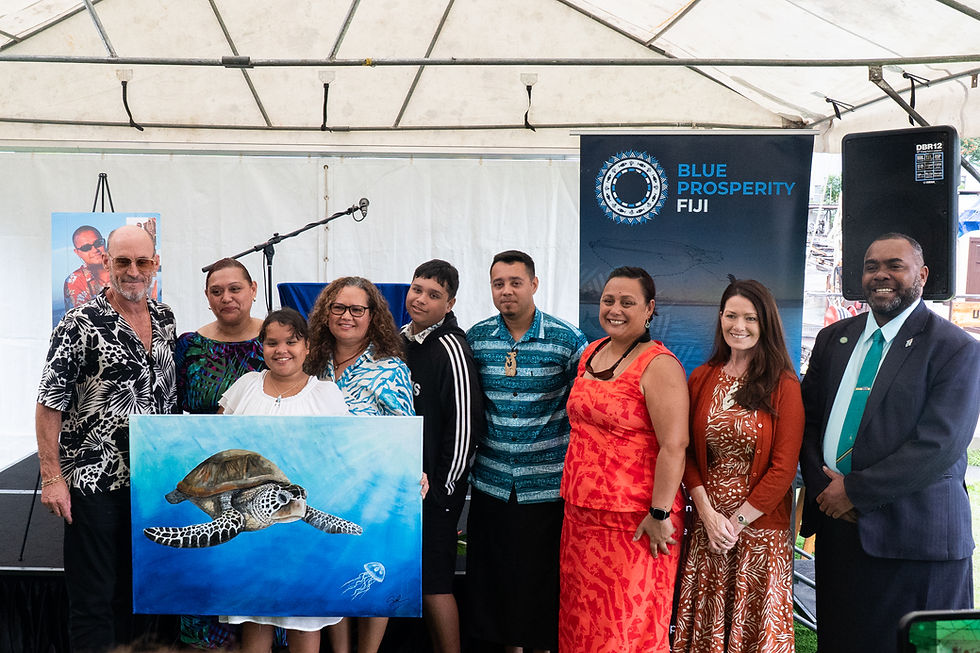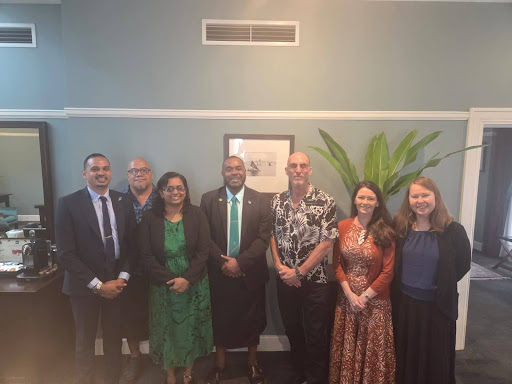A Shared Vision For Fiji's Sustainable Blue Economy Unites Key Stakeholders.
- Blue Prosperity Fiji

- May 21, 2024
- 4 min read
Updated: Jun 2, 2025
21 May 2024 - The Fiji Government, in partnership with Blue Prosperity Fiji and the United Nations Development Programme, hosted a Blue Economy Workshop to bring together stakeholders across sectors to align on a vision for Fiji’s Blue Economy, address obstacles, and identify opportunities to further unlock sustainable economic growth.
In opening the workshop, Deputy Prime Minister and Minister for Finance, Strategic Planning, National Development, and Statistics, Hon. Professor Biman Prasad, emphasized that a Blue Economy cannot exist without a healthy ocean.
“The Blue Economy is a crucial part of our effort to ensure a brighter future for all people of Fiji today and for our generations to come. It emphasizes sustainable economic growth while also ensuring environmental and social sustainability – the two must be mutually inclusive,” the Deputy Prime Minister said.
Deputy Prime Minister Prasad highlighted the Government of Fiji’s commitment to promote a healthy ocean by sustainably managing 100% of its ocean and fully protecting 30% of its Exclusive Economic Zone through a Marine Spatial Plan.
”Fiji encompasses 98% ocean. Therefore, a large percentage of the economy should be ocean-based, and the path to a sustainable Blue Economy holds immense growth opportunities,” stated Taholo Kami, Blue Prosperity Fiji Strategic Advisor.
Mr. Kami underscored that achieving this vision requires a healthy and productive ocean, enabling policy frameworks, robust enforcement, decisive political leadership, strategic investments, enhanced human capacity, and scalable initiatives.
Panel discussions and presentations covered Blue Economy efforts across sectors, including fisheries and aquaculture, carbon and nature-based solutions, maritime education, surveillance and enforcement, tourism, maritime transportation, renewable energy, and more.
The Permanent Secretary for Environment and Climate Change, Dr. Sivendra Michael, said the participants gathered to unite across sectors for the future of our nation and to forge a cohesive vision for Fiji’s sustainable Blue Economy.
“I urge everyone to engage fully in this workshop. Share your insights openly, as your contributions are invaluable. Together, we can foster a healthy ocean and a thriving Blue Economy, ensuring a prosperous future for Fiji,” stated Dr. Michael.
Workshop participants included high-level officials from across government, reflecting Fiji's holistic approach to sustainable ocean management. Government attendees included representatives from the Office of the Prime Minister, the Ministry of Fisheries and Forestry, the Ministry of Education, the Ministry of Tourism and Civil Aviation, the Ministry of Finance, the Ministry of Trade, the Ministry of Local Government, the Ministry of Rural and Maritime Development, the Ministry of iTaukei Affairs and iTaukei Affairs Board, and the Ministry of Environment and Climate Change. Also present were officials from the Reserve Bank of Fiji, and the Republic of Fiji Navy.
Representatives from the private and public sector also played a significant role in the discussions, highlighting the interplay between governmental strategies and private enterprise in the Blue Economy. Notable participants included leaders from the Fiji Development Bank, Investment Fiji, the Fiji Hotel and Tourism Association, the Fiji Fishing Industry Association, the Pacific Fishing Company, and the Maritime Safety Authority of Fiji.
Non-governmental organizations (NGOs) were well-represented, contributing their expertise and perspectives on environmental sustainability and conservation. Prominent NGOs at the workshop included the World Wide Fund for Nature, Wildlife Conservation Society, Conservation International, and the International Union for Conservation of Nature, all of which have active projects and interests in the Pacific region’s marine environments.
Academic institutions were also important participants, with faculty and research leaders from the University of the South Pacific, University of Fiji, and the Fiji National University. Their presence emphasized the need for research and educational support in formulating effective Blue Economy strategies.
Civil society organizations like Women in Fisheries and the Sustainable Sea Transport Initiative provided grassroots perspectives, essential for ensuring that Blue Economy policies are inclusive and consider the socio-economic impacts on local communities.
The Council of Regional Organisations of the Pacific (CROP) agencies, including the Office of the Pacific Ocean Commissioner, the Pacific Islands Forum Secretariat, the South Pacific Community, and the Pacific Islands Development Forum. These bodies play a pivotal role in regional governance and cooperation, facilitating integrated approaches to ocean management.
Finally, international development agencies were also well-represented, signifying the global interest in Fiji’s Blue Economy initiatives. This group included the United Nations Resident Coordinator's Office, the United Nations Development Programme, the Food and Agriculture Organization, the Asian Development Bank, GIZ (Deutsche Gesellschaft für Internationale Zusammenarbeit), the Japan International Cooperation Agency, World Bank, and the British High Commission. Their participation underscores the broad international support for sustainable development projects in Fiji and the Pacific.
Participants outlined a definition of the Blue Economy, gained a shared understanding of Fiji’s Blue Economy profile, aligned and prioritized opportunities, and needs for developing Fiji’s Blue Economy in support of the National Ocean Policy, and defined roles and oversight mechanisms.
About Blue Prosperity Fiji
Blue Prosperity Fiji (BPF) is a programme to support a healthy ocean, thriving communities, and prosperous economies in Fiji. Led by the Government of Fiji, the Blue Prosperity Fiji programme employs community consultations, scientific research, and traditional knowledge to sustainably manage 100% of Fiji's ocean space and designate 30% in fully protected areas while supporting ocean industries and fisheries management.
The programme includes close collaboration with communities, stakeholders, NGOs, and existing ocean management efforts in Fiji. It is designed to support inclusion, equity, and traditional knowledge to improve long-term economic stability, livelihoods, and ocean ecosystems.





Comments